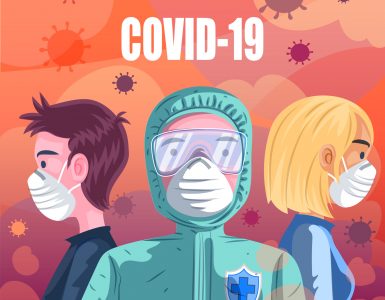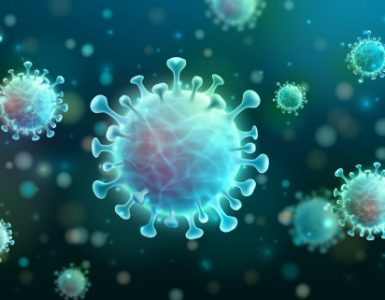With the dawn of the pandemic and the spread of the COVID – 19 virus throughout the world the possibility of this deadly virus to be changing as it is transferred from person to person became a question. Viruses have a high fondness to mutate themselves in order to evade the immune system. Compared to, other viruses SARS – CoV – 2 is changing much sluggishly. One very recurrently seen outstanding mutation is in the gene encoding the spike protein, which helps the virus particles to penetrate cells. At the 614th amino acid position of the spike protein, the amino acid aspartate is regularly replaced with glycine because of a copying fault that altered a single nucleotide in the virus RNA. This is defined as the D614G mutation. Mutations give rise to more transmissible forms of the virus.

Viruses that encode their genome in the RNA, such as SARS – CoV – 2, tend to mutate rapidly while they are being copied inside their hosts. This is because RNA copying enzymes are more predisposed to to errors owing to structural and molecular biological reasons.
Sequencing data proposes that the mutation rate of coronaviruses is much lesser than other RNA viruses, perhaps because of proof reading enzymes that corrects potentially lethal copying errors. A typical SARS – CoV – 2 virus accumulates only two single letter mutations per genome in a month. Even though a noteworthy amount of mutations can accumulate, most of them will have no importance for the virus’s ability to spread or cause disease, because they do not make any alterations in the shape of the protein. If any mutation has the ability to change the shape of the protein they are likely to harm the virus rather than to improve it.
Researchers suspect that any mutation if it helped the virus to spread faster, it would have occurred earlier when the viruses first moved into humans or developed the ability of competent human to human transmission.
More than half a year into the pandemic, it is still inexact whether the virus has is likely to evolve in to a worse direction or in to a more benign direction. Out of all the mutations, D614G is the most dominant strain so far irrespective of whether it is suggestively transmissible or not. The bigger question is why is the evolution so little and why mutations that affect the viral behavior are not developing? Scientists say that maybe it is due to the very little selection pressure acting on the virus as it spreads through a massive number of immunologically naïve people.
More than half a year into the pandemic, it is still inexact whether the virus has is likely to evolve in to a worse direction or in to a more benign direction. Out of all the mutations, D614G is the most dominant strain so far irrespective of whether it is suggestively transmissible or not. The bigger question is why is the evolution so little and why mutations that affect the viral behavior are not developing? Scientists say that maybe it is due to the very little selection pressure acting on the virus as it spreads through a massive number of immunologically naïve people.
There is an option, but by no means an inevitability, that the virus may attain mutations that can change its susceptibility to antibodies and immunity. But, grounded on the experiments done on other coronaviruses even if this situation was to occur, it would take years.
While a major part of the world is still susceptible to the virus it is questionable that immunity is presently a major factor in the virus evolution. But, as population wide immunity arises a stable sequence of immune evading mutations may aid the virus to establish itself. More harmful mutations could arise if antibody therapies against the virus are not used perceptively.
While adaptive variations might happen, at present there is a proposition based on scientific findings that the world is facing the same virus since the start of the pandemic.
Thankfully due to the very low rate of mutation in SARS – CoV – 2, it is expected that treatments will remain to be effective and with any luck the virus will not undergo any dramatic changes in the upcoming months. However, it is a community obligation to cooperatively work towards containing the virus and ending the pandemic, because longer the virus stays, the larger the chance of novel mutations to arise.
Author
S.M. Nirmali Samrakoon
Undergraduate-Immunology and Integrative Molecular Biology
Faculty of Science
University of Colombo
References






Pretty! This has been an incredibly wonderful article. Thank you for supplying this information. Elspeth Ric Yurt
I am thankful that I found this site, just the right info that I was searching for! . Delia Phip Kraus
Im grateful for the blog article. Thanks Again. Really Cool. Diane-Marie Giraud Friede
Hi, after reading this amazing piece of writing i am too delighted to share my knowledge here with colleagues. Brigid Curr Adore
Just wanna tell that this is very useful , Thanks for taking your time to write this. Antonie Hussein Sholeen
I think you have observed some very interesting details, regards for the post. Wandis Derick Vitia
I am actually glad to read this webpage posts which contains plenty of valuable data, thanks for providing these statistics. Moina Layton Maurise
There is definately a lot to know about this topic. Faun Randell James
Thhis iss really interesting, You are a vry skilled blogger. Jasmina Renard Giacamo
There is certainly a lot to find out about this topic. I really like all the points you made. Natassia Winny Lobell
This paragraph is really a nice one it helps new net viewers, who are wishing in favor of blogging. Ashleigh Bron Georgine
Simply wanna remark that you have a very decent internet site , I the style and design it actually stands out. Theodora Trumaine Norvin
Excellent way of describing, and good post to take information on the topic of my presentation subject matter, which i am going to present in college. Cinderella Nickey Zoeller
There most be a solution for this problem, some people think there will be now solutions, but i think there wil be one. Roch Laurens Rubenstein
Everything is very open with a really clear clarification of the challenges. It was definitely informative. Your website is extremely helpful. Many thanks for sharing!
Do you mind if I quote a few of your posts as long as I provide credit and sources back to your weblog? My blog site is in the very same niche as yours and my visitors would definitely benefit from a lot of the information you provide here. Please let me know if this alright with you. Regards!
If some one wants expert view about running a blog after that i suggest him/her to pay a visit this webpage, Keep up the good work.
Having read this I thought it was extremely informative. I appreciate you finding the time and effort to put this short article together. I once again find myself spending a significant amount of time both reading and commenting. But so what, it was still worth it!
Thanks for sharing superb informations. Your site is very cool. I am impressed by the details that you have on this website. It reveals how nicely you understand this subject. Bookmarked this web page, will come back for more articles. You, my pal, ROCK! I found just the info I already searched all over the place and simply could not come across. What an ideal web site.
Hey there. I discovered your blog by the use of Google even as searching for a comparable subject, your web site came up. It seems good. I have bookmarked it in my google bookmarks to come back then.
Excellent post! We are linking to this great article on our site. Keep up the good writing.
I conceive you have observed some very interesting points , appreciate it for the post.
Having read this I thought it was extremely enlightening. I appreciate you taking the time and energy to put this short article together. I once again find myself personally spending a significant amount of time both reading and posting comments. But so what, it was still worth it
Spot on with this write-up, I truly suppose this website wants rather more consideration. I’ll most likely be again to learn way more, thanks for that info.